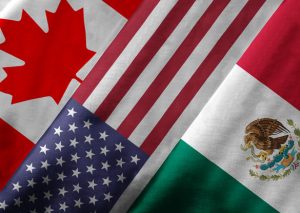U.S., Mexico Strike Preliminary Agreement in Principle on NAFTA Provisions; U.S.-Canada Talks Await
On Monday, the U.S. announced an agreement in principle regarding aspects of the North American Free Trade Agreement (NAFTA), albeit in a bilateral sense, as Canada remained on the sidelines of the talks between the U.S. and Mexico.
Need buying strategies for steel? Try two free months of MetalMiner’s Outlook
“The United States and Mexico have reached a preliminary agreement in principle, subject to finalization and implementation, to update the 24-year-old NAFTA with modern provisions representing a 21st century, high-standard agreement,” the Office of the United States Trade Representative (USTR) said in a release. “The updated agreement will support mutually beneficial trade leading to freer markets, fairer trade, and robust economic growth in North America.”
Talks to modernize the 24-year-old trilateral trade agreement began in August 2017 and underwent numerous rounds, encountering challenges along the way.
The dialogue seemed to come to a standstill midsummer, as Mexico prepared for its July 1 presidential election (won by Andrés Manuel López Obrador, who will succeed Enrique Peña Nieto). Peña Nieto’s term concludes in November.
Nonetheless, the parties struck a deal with Peña Nieto still in office. Trump referred to the agreement with Mexico as the “United States-Mexico Trade Agreement” during a phone call Monday with Peña Nieto, saying that NAFTA has a “bad connotation” in the U.S.
Critically, according to the Washington Post, the agreement did not address whether the tariffs on Mexican steel and aluminum would remain in place. Like Canada and the European Union, Mexico initially had a temporary exemption to the 25% steel and 10% aluminum tariffs, but those exemptions expired June 1.
A major point of contention throughout the process has been regional auto content; that is, the percentage of a vehicle that must be made using North American materials. NAFTA called for 62.5% of the content of a vehicle to originate in North America in order for the sale of that vehicle in the market to be tariff-free.
According to the preliminary agreement, that percentage is upped to 75%.
“This deal encourages United States manufacturing and regional economic growth by requiring that 75 percent of auto content be made in the United States and Mexico,” according to a USTR release.
In addition, the preliminary deal includes reference to labor
“To support North American jobs, the deal requires new trade rules of origin to drive higher wages by requiring that 40-45 percent of auto content be made by workers earning at least $16 USD per hour,” a USTR release states.
What About Canada?
The big question looming over the proceedings is how to incorporate Canada into the preliminary deal between the U.S. and Mexico.
The Mexican president explained his desire for Canada to join the fold in a trilateral agreement.
“It is our wish, Mr. President, that now Canada will also be able to be incorporated in all this,” the Mexican president said to Trump during their phone call Monday. “And I assume that they going to carry out negotiations of the sensitive bilateral issues between Mexico — rather, between Canada and the United States.”
He reiterated the stance later on in the call.
“And I really hope and I desire — I wish — that the part with Canada will be materializing in a very concrete fashion; that we can have an agreement the way we proposed it from the initiation of this renegotiating process, a tripartite,” he said.
Trump indicated talks with Canada will begin in the near term.
“Canada will start negotiations shortly,” he said. “I’ll be calling the Prime Minister very soon. And we’ll start negotiation, and if they’d like to negotiate fairly, we’ll do that. You know, they have tariffs of almost 300 percent on some of our dairy products, and we can’t have that. We’re not going to stand for that.
“I think with Canada, frankly, the easiest thing we can do is to tariff their cars coming in. It’s a tremendous amount of money and it’s a very simple negotiation. It could end in one day and we take in a lot of money the following day.”
For more efficient carbon steel buying strategies, take a free trial of MetalMiner’s Monthly Outlook!
Despite Trump’s rebranding of NAFTA, USTR Robert Lighthizer said no decision had been made on that front, according to the Washington Post report.
Whatever the case, while Monday’s announcement represented public movement in a process that has often moved incrementally at its quickest throughout the past year, NAFTA’s fate remains unclear. It remains to be seen if the preliminary deal with Mexico can hold if the U.S. cannot reach an agreement with Canada.
According to Reuters, Canadian Foreign Minister Chrystia Freeland is scheduled to visit Washington on Tuesday, Aug. 27.
In addition, while Trump dubbed the preliminary deal as the United States-Mexico Trade Agreement, the deal cannot effectively replace NAFTA unless specific actions are taken.
According to Article 2205 of NAFTA, any party within the agreement must proven written notice of withdrawal.
“A Party may withdraw from this Agreement six months after it provides written notice of withdrawal to the other Parties. If a Party withdraws, the Agreement shall remain in force for the remaining Parties,” Article 2205 states.
In short, while Monday’s announcement was indeed a step, it remains to be seen whether that is a step toward a new and complete NAFTA comprising all three original parties, or if marks a step in another direction.



Leave a Reply